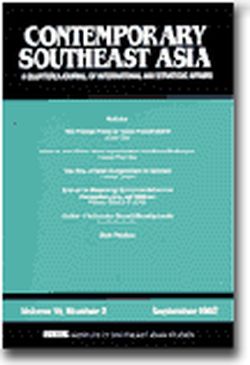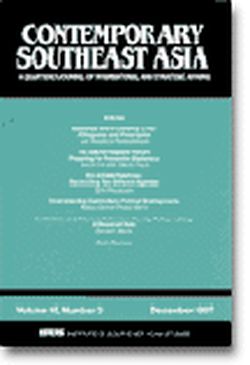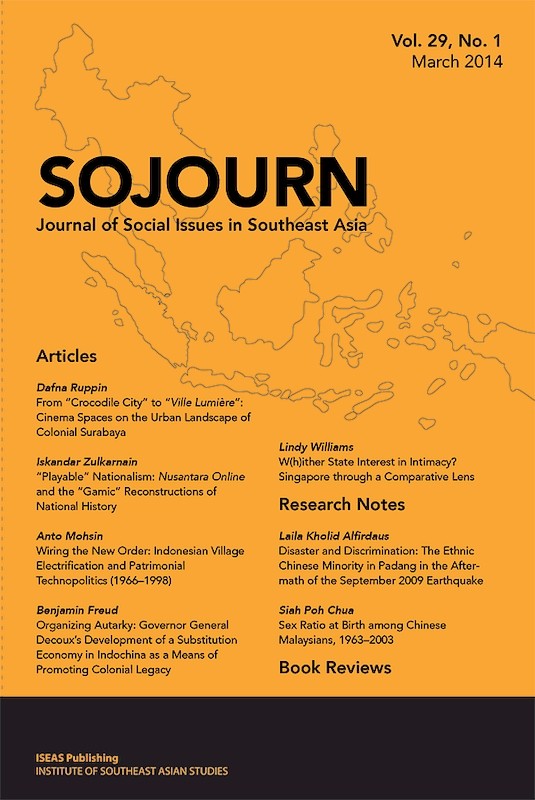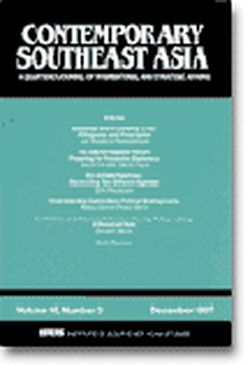Contemporary Southeast Asia: A Journal of International and Strategic Affairs Vol. 19/2 (Sept 97)

Date of publication:
September 1997
Number of pages:
100
Code:
CS19/2
Contents
-
Preliminary pages
- ARTICLES
-
The Foreign Policy of Great-Power China, by Denny C Roy, author see abstractThe Chinese Government insists that even as a great power, China will not attempt to establish hegemony or a sphere of influence in the region. Going beyond the stated intentions of the present leadership, this article evaluates the factors that might disincline China towards hegemony, including the unique characteristics of modern Chinese foreign policy, the likely reaction of other states to growing Chinese power, China's widespread poverty, its pre-modern track record as a "benign" hegemon, and the type of international system Beijing appears to favour. The conclusion is that the purported restraints to China rising to the position of dominant regional power are not convincing. Nevertheless, China can achieve this goal through avenues its neighbours will accept, without resorting to force or coercion.
-
Vietnam and China: New Opportunities and New Challenges, by Chang Pao-Min, author see abstractBy the mid-1990s Vietnam and China had mended their ties with all former foes and entered a new era of friendly intercourse. New opportunities were open to them to concentrate on domestic development and to benefit from mutual co-operation. However, precisely because both countries hove never felt more secure than they are today, Vietnam and China are also faced with the new challenge of exercising caution, skill and self-restraint in coping with the new power vacuum in Southeast Asia and in settling their outstanding territorial disputes.
-
The Rise of State Corporatism in Vietnam, by Yeonsik Jeong, author see abstractOne social consequence of economic reform in Vietnam has been the proliferation of non state socio-economic organizations that represent diversified and often conflicting socio-economic interests. The purpose of this article is to examine the relationship between the Vietnamese state and interest groups and the factors that have shaped the relationship. The article concludes that the Communist Party of Vietnam has institutionalized a state-corporatist system which enables the party to effectively control and manage the emerging interest groups.
-
End of the Beginning: Economic Reform in Cambodia, Laos, and Vietnam, by Ronald Bruce St John, author see abstractIn 1979, Cambodia, Laos, and Vietnam implemented selected economic reforms which began to reverse the socialist economic policies pursued after 1975. In the beginning, the scope and sequence of these reforms appeared similar, but over time, each government increasingly pursued its own package of reforms. This article compares the reforms implemented in agriculture, state-owned enterprises, and the macroeconomic arena to illustrate the different paths taken by the three states once known collectively as Indochina. In the process, it highlights areas of each economy which require additional reform to ensure social stability and sustainable economic development, and the impact that differing reform strategies may have on sub-regional development initiatives.
-
Golkar of Indonesia: Recent Developments, by Leo Suryadinata, author see abstractGolkar has been described as an electoral machine to legitimize the Indonesian military's involvement in politics. How ever, it also represents the abangan (or liberal Muslim) culture. In the last six general elections, the function of the electoral machine was clear but the abangan elements underwent some changes. There was indication that some santri (or strict Muslim) elements had also crept into Golkar. The split within Golkar along both military-civilian and religious lines has become more obvious. Nevertheless, President Soeharto's control of Golkar has increased significantly. However, the future of Golkar in the post-Soeharto era is uncertain.
- BOOK REVIEWS
-
BOOK REVIEW: Negotiating the Pacific Century: The "New" Asia, the United States and Australia edited by Roger Bell, Tom McDonald and Alan Tidwell, by Alan Dupont, author
-
BOOK REVIEWS: India Looks East: An Emerging Power and its Asia Pacific Neighbours edited by Sandy Gordon and Stephen Henningham, by Dipankar Banerjee, author
-
BOOK REVIEW: Naval Power in the Pacific: Toward the Year 2000 edited by Hugh Smith and Anthony Bergin, by Renato Cruz De Castro, author
-
BOOK REVIEW: Communicating with Asia: Understanding People and Customs by Harry Irwin, by Yao Souchou, author




